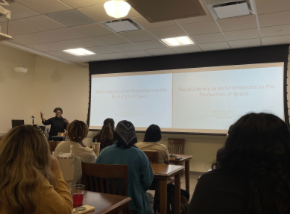
Last Wednesday, a full classroom of students gathered in Old Main to participate in Doctor Asilia Franklin-Phipps’ discussion on racial literacy. The “Read the Room!” event, organized by the Future Teachers of Color club, focused on the role of anti-racism in education.
Franklin-Phipps is a professor in education and leadership studies who currently teaches three undergraduate and graduate courses, respectively, centered around ideas of racial literacy and education. She started out as a high school teacher in Los Angeles before moving to New York where she would become a graduate student, earning her Ph.D. in critical socio-cultural studies in education with a cognate in African American education. She lived in Oregon before settling in the Hudson Valley.
The discussion began with Franklin-Phipps putting up a slide listing out a series of critiques she has against anti-racism. Grabbing the attention of the audience, she established that this is “hard and uncomfortable” and there are many surface-level ideas that do not really get at the roots of racism in our society. She finds that institutionalized anti-racism is politically-avoidant, language obsessed and often only followed so people feel good about themselves. “This ignores the impact of the dialogue and discussion on people impacted by racism,” she said. Franklin-Phipps, during the event and in teaching her classes, took a different approach.
“I think I’m interested in something much more nuanced and deeper than anti-racism as it’s been popularized and characterized about learning the rules, rather than becoming a different person,” she said. “I want more. I want more than anti-racism. I want anti-oppression. Anti-racism is the baseline. I want much more than that.”
During the event, Franklin-Phipps discussed the concept of space as a way of thinking about race. This is part of the critical geography field of study. “Critical geographies are interested in thinking about how space is produced by things like policy, history and power.” To her, and others in this field, spaces are not neutral. Something as simple as a park bench may have spikes on it to deter skateboarders which is “intentionally producing a space that keeps some people out and welcomes other people.”
Williamsburg, Brooklyn was used as an example during the event to show how a space can change. When Franklin-Phipps was a grad student in the early 2000s living off student loans, Domino Park in Brooklyn was an open space where anyone could sit by a few rats and stare off at the lights of Manhattan just across the East River. Now, the space has become a polished, gentrified park constructed in a way which keeps people out. Describing it as a place which used to be for “broke artists and musicians,” Franklin-Phipps placed an emphasis on how the cashless food vendors present in the park exclude many community members, making it a very non-neutral space.
“It’s about race, but it’s about gender and sexuality and pop culture and literature and film and art. It’s about everything. It’s about space and geography and I want students to understand that,” Franklin-Phipps stated.
Franklin-Phipps defined racial literacy as not relying on narratives to answer questions of race.
As a discussion on racial literacy, Franklin-Phipps and Future Teachers of Color believe in the need for all students to get involved, regardless of the race they identify as or the major they are pursuing. Cara Breitenbach, president of Future Teachers of Color, is committed to bringing this open space to SUNY New Paltz. “One of our missions as future educators and for this club is to create events where we’re opening dialogue- difficult dialogue not just for people of color, but for everyone on campus.”
Breitenbach was one of the original founders of the club last spring along with former president, Jody Clarke. The club was created as a “place for teacher candidates to create a space for BIPOC future educators.” She, and others, want to create these spaces, such as the “Read the Room!” event to be uplifting for those who feel marginalized at SUNY New Paltz as a predominantly white institution or PWI.
“Learning racism and its structure and how it was formed, how it continues today, is an ongoing process and an ongoing development that is different for individuals. So, when you have professors who all give you one perspective and then you have that one professor, who is a person of color, who gives you a different perspective, you wonder, “what’s missing?” Breitenbach said.
As a professor in the School of Education, Franklin-Phipps emphasizes the important role of racial literacy in educators. “We have a ton of research that shows that many students of color have horrible experiences in K-12 and college. So if everyone teaching is doing the right thing that wouldn’t be the case.” She believes that having more faculty of color is important for everyone because it gives a greater diversity of perspectives.
The event last Wednesday had a very high turnout with audience members crowding untaken chairs along the back wall. Franklin-Phipps was shocked by how many students showed up. “I think that suggests that there’s not enough spaces where this conversation is happening in a nuanced complex way. So I think we have to do a little bit better.”
Future Teachers of Color looks to do just that. You can follow them on Instagram for future events @futureteachersofcolor.np.
